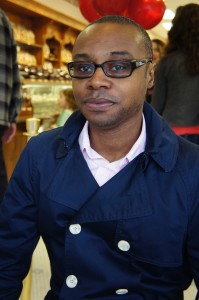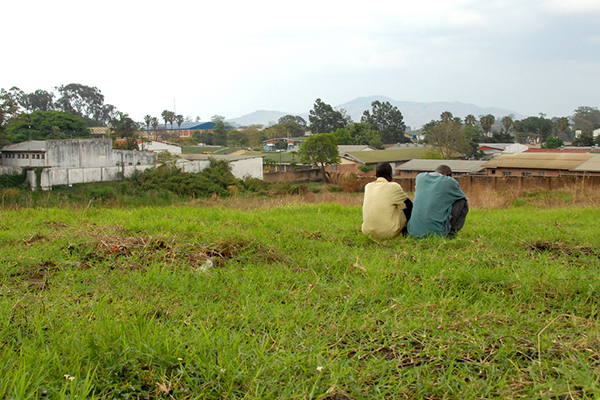In most African countries, being gay means living in constant fear. For example, an anti-homosexuality bill recently signed by Uganda President Yoweri Museveni calls for 14 years in prison for first time offenders and life in prison for repeat offenders. Even those who don’t report gay friends and loved ones are considered to be breaking the law.
The move drew condemnation from world leaders, including key Western supporters of Uganda. President Barack Obama called it “a step backward for all Ugandans.”
What is the root of this extreme political agenda? And what does this mean for the future of sexual politics in nations around the world? These are just a few questions Xavier Livermon, assistant professor of African and African Diaspora Studies, addresses in his new course, “AFR 372G: African Queer Studies.”
We caught up with Livermon for more details about the course, which is the first of its kind to be offered to undergraduates. Read on to learn more about the increasing political intolerance in Africa—and how academic activists can effectively combat anti-gay legislation in nations around the globe.
Please briefly describe your new African Queer Studies course.

The course takes a look at LGBT life in contemporary sub-Saharan Africa. We do so by investigating the major issues that affect LGBT Africans. We think critically about the historical construction of sexuality on the African continent both in local and global terms. Ultimately, I want students to understand how sexuality informs politics and how the contestation over the rights of LGBT Africans is connected to a host of other issues including the political economy, nationalism and globalization.
What made you decide to devote an entire course to this particular area of study?
The issue of the rights of LGBT Africans has become a topic in the Western media and a concern for both international human rights observers and American foreign policy. I felt that a course like this could serve at least two primary objectives: first to get students to think critically about the kinds of debates that we have concerning sexuality, citizenship and rights in a global context; second, how might these struggles globally inform our own debates here in the United States? One of the things that I have been really concerned with is the way in which the issue of LGBT rights in Africa has given the United States and other western countries a platform to lecture Africans about human rights in a way that completely obscures U.S. violations of human rights both at home and abroad.
What are some of the biggest challenges for homosexuals in Africa today?
There are a lot of issues, but the ones that I could identify as most salient. First, the laws that attempt to legislate gender and sexual non-conforming Africans out of existence and to suggest that they have no right to citizenship in their own countries because of their gender and sexual non-conformity. Second, the ways in which western LGBT activists engage with local African movements. Sometimes this engagement is not always helpful and may actually endanger the very communities that it is meant to protect. I think that western-based LGBT movements have to do a better job of engaging African LGBT movements on the ground and treating African activists as equal partners in alliance. A third salient issue involves a host of social welfare issues, including appropriate access to health care and opportunities to make a living wage.
How can academic activists help combat anti-gay legislation, such as the recently passed bill leveling harsh penalties on Ugandan’s LGBT community?
The most important thing is to talk to activists and communities on the ground and to do the hard labor of building alliances across differences; to engage activists in Uganda about what they need and what kind of support or help might be useful, including perhaps no help at all. What I mean by this is that for some activists on the ground, it is precisely the kinds of attention from Western-based academics and activists that have the effect of making LGBT activism appear as an attack on local sovereignty and of obfuscating local concerns. I have been concerned about a lot of these interventions that ultimately portray African LGBT citizens as completely lacking in agency, waiting to be saved by benevolent Westerners.
What made you decide to open up this unique course to undergraduates?
The debates about LGBT citizenship in Africa gives students the unique opportunity to take the tools that they have learned throughout their undergraduate courses here at UT and apply it to a contemporary issue. It is an opportunity to really think about things they are learning theoretically and apply this theoretical learning to a contemporary, relevant case study.
What do you hope your students will take away from the course?
At some basic level I want students to understand the African LGBT experience as a human experience and that their struggle for recognition and visibility is one that we can all understand and identify with. Furthermore, issues of sexual citizenship are complicated and are not disconnected from a host of other issues including colonial history, contemporary political economy, and globalization and development. Understanding the connection between sexuality and larger socioeconomic and political forces is key I believe not only to securing the freedom and humanity of African LGBT people but for imagining what a more just and equitable world could look like for us all.
Is there anything else you’d like to add?
I hope that students who are interested in this subject matter will consider joining the conversation the next time the class is offered.
Photo credit: Travis Lupick / Flickr
